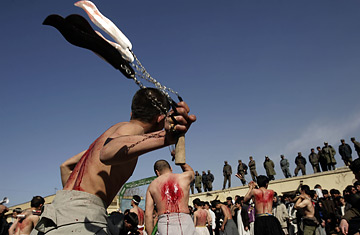
Afghan Shi'ite men beat themselves with chains to commemorate Ashura in Kabul.
Imam Ali Hussein died 1327 years ago, but for the Shi'ite Muslim faithful in Kabul — and everywhere else — it might as well have been yesterday. There is a vivid intensity to their mourning of the grandson of the Prophet Muhammad with black banners, dirges, funereal marches and somber sermons in mosques — and also by ritual bloodletting and physical mortification. Every year, during the festival of Ashura, Shi'ites symbolically punish themselves for their failure to rally to their imam at the Battle of Karbala and save him from his enemies in a conflict that marked the beginning of the Sunni-Shi'ite schism.
In the centuries-old mud brick shrine of Abu Feisal, more than a hundred men push into the tiny prayer room. Outside, the temperature is below freezing, but inside the air is thick and pungent with the heavy scent of perspiration. A small microphone is turned on, and a middle-aged man with a face creased with grief began chanting a mournful dirge. The penitents, sitting in rough circles, begin to pound their chests in a powerful rhythm amplified by a hundred chest cavities. Deep and as resonant as a heartbeat, the sound gradually changes tenor as thin cotton shirts split with the force of repeated blows and palms slap bare skin. Men wail.
This is no desultory passion play. Even a non-religious foreign observer cannot fail to be moved by the intensity of faith that courses through the tiny room, a collective surge of emotion connecting today's Shi'ites with the events that marked their division from Sunnis and centuries of persecution, warfare and sectarianism. It is a powerful ritual of Shi'ite unity — one that the Sunni Taliban leadership attempted to curtail during their reign in Kabul.
The chanting grows more frenzied, and as the seated men raise their voices to join in with shouts of "Ya Hussein!" (Oh Hussein!) and "Islam Zindabad!" (Long Live Islam!), a few move to the middle of the circles, chain flails gripped in both hands. The chest pounding grows stronger, quicker and louder. Following the rhythm, the men in the middle crouch down, spring from the ground and use the full force of acceleration to slam the flails down on their exposed backs. Bruises bloom, dark and malevolent, but their faces register no pain, only grief, or an almost otherworldly conviction.
The last day of Ashura is marked by the spilling of blood. This time, the flails are tipped with razor-sharp blades the shape of elongated hearts. This time, it's public. The penitents march through the streets in orderly rows and pause in front of the shrine. Again the mournful chanting, and the whipping begins, blades flashing in the sun. The air is thick with the metallic edge of fresh blood. It is as much a public spectacle as a demonstration of faith. "Everyone who watches is mourning for Hussein as well," says Ali Hosseini, an 18-year-old who has just pulled a black T-shirt over his lacerated back. Slowly the faded cotton darkens with blood. "Their presence gives us power." Indeed, the presence of an audience appears to egg on the penitents. The strikes are harder in the presence of video cameras and camera phones. Still, he says that he feels no pain. "Our imam was killed, his blood was shed for Islam, so we shed our blood for Islam. The pride eclipses the pain."
Rooftops in the old city are crowded with spectators; a tin roof buckles under their weight. Police have closed down the streets; Afghan National Army soldiers guard intersections — Ashura rituals have often attracted Shi'ism's most violent sectarian foes, as the violence that has in recent days wracked Najaf in Iraq, and Karachi and Peshawar in Pakistan, where 14 were killed on Sunday in a suicide bombing. But here in Kabul, the only blood spilled is that collecting at the feet of the participants. "We are all Muslim. It is not important whether we pray with open hands (as do the Shi'ites) or closed hands," says Khalil Umrani, who helps organize the Ashura events. "Living as we do in a war-stricken country, it is useless to fight against each-other."
As bloodied penitents stumble from the circles, others rush in to grab their places. Flails are handed off to newcomers, and the crowd surges to enfold the wounded with scarves that become souvenirs, rendered holy by the blood of living martyrs. Throughout the day, waves of barebacked young men enter the circles, and then return to the crowd bleeding and triumphant.
As I watch wings of blood sprout on the backs of men, I'm reminded of the French political philosopher who once said that nations are built on the shared spilling of blood. The Shias of Afghanistan may be mourning the death of Ali Hussein centuries ago, but what they are also doing is cementing an identity that is reinforced year after year. Blood brothers, indeed.
